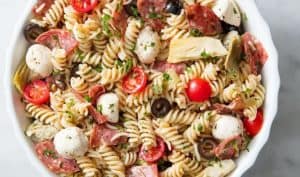The Top 5 Ways Food Affects Your Mood

Self-care means that you’re able to understand your body and its needs. This includes the foods that you eat and how they affect you. Food cravings are most often an emotional hunger – it’s your body’s way of communicating that basic needs are not being met.
1. Mindful Eating

It’s not always easy to stop eating when we’re full.
Eating often feels like a means to an end. Our hunger just needs to be satiated. We all know the importance of eating a balanced diet but when push comes to shove, do we follow through? And, worse still, do we even understand what balance really means? Eating a balanced, wholesome diet is so much more than just consuming a colorful plate. It’s about eating foods that nourish your body from the inside out. And in order to truly nourish your body, you need to first understand it. Mindful eating is the opposite of eating for necessity or escape. You learn to eat slowly, without distraction and recognize your body’s diverse needs.
With this in mind, there is a connection between our emotional responses and eating certain foods. This is where the idea of cravings and intuitive eating evolved from. Intuitive eating is sometimes seen as an excuse for emotional eating but it’s important to understand the difference between the two. Emotional eating is eating in response to how you’re feeling in the moment rather than addressing your body’s emotional needs. Intuitive eating is an understanding of your body, how it works and what it needs at any given moment.
2. Sugar-Stress Connection

Stress causes cravings.
Stress affects the synchronicity of your hormones which means that your body develops cravings to rebalance those hormones. I know I’m not the only one that starts inhaling chocolate at the first sign of stress. Chocolate releases endorphins which enhance feelings of euphoria. When we can’t provide excitement for ourselves, sugar does it for us. Because of these mood-enhancing qualities, chocolate possesses certain addictive qualities. Seeing as sugar isn’t the most nourishing of nutrients, it’s important to get this connection under control.
For me this means that when I’m stressed and start feeling those cravings, I turn to intuitive eating. Either I treat myself with a bit of dark chocolate or, depending on the stress levels, I’ll go for a run to release endorphins in a more natural and productive manner. Instead of thinking of exercise as a chore, think of it as a way to feel better. Once you can place the root of your emotional craving, you’re better equipped to deal with it in a healthy way alternative to binge eating.
3. Carb-Comfort Connection

Pasta is the ultimate comfort food.
Complex carbohydrates are known to be associated with comfort. Much like everything else that we’ve discussed, this shouldn’t come as a surprise. When I’ve had a stressful day at work all I want when I get through the door is a bowl, or three, of pasta for dinner. This is because my body is telling me something. Complex carbohydrates, such as whole grains, induce the brain to increase serotonin. This hormone contributes to our overall feelings of wellness and happiness. Complex carbs also help in stabilizing our blood pressure which reduces stress. It makes perfect sense then, that when we need that extra comfort boost, our body craves carbs.
By knowing this we are better able to feed our body appropriately. When I’m in need of some comfort I try to feed myself healthy and nutritious versions of what would be my go-to’s. Whether it’s a bowl of hot lentil soup or whole grain pasta, it’s okay, nay necessary, to feed your emotions – just make sure that you’re doing it in a way that nourishes your body as well as your mind.
4. Nutrients And Mood

Getting all your vitamins into your diet will benefit your mood.
There is a strong link between certain mental issues and vitamin deficiency. What we eat helps us to understand how we feel, and vice versa. The goal is to fix the physical aspects of your food cravings so that you’re able to deal with the emotional causes. In this vein, it’s clear that there are specific vitamins that can help deal with particular moods. For example, vitamin B’s are essential to emotional well-being and have been proven to ease depression in extreme cases.
Specifically, vitamin B6 is associated with the process of the building blocks of amino acids and some hormones. You need this vitamin to make serotonin and dopamine which are both hormones linked with feeling good. This is similar to the effects of fiber which increases serotonin in the body. Meanwhile, folate is crucial in the formation of S-adenosylmethionine (also known as SAM). SAM contributes to methyl groups that are necessary for neurological function. In a nutshell, if you’re looking to deal with your depressive mood, you should be focusing on foods that are nutrient-rich, namely vitamin B, fiber and folate.
Understanding your body on a cellular level is part-and-parcel of proper self-care. Our food cravings fluctuate based on our emotional needs. Sometimes cravings are needs that have to be met and other times they’re reminders from your body that you’re missing something that can possibly be achieved in a healthier, more holistic practice.
“Take care of your body. It’s the only place you have to live.” Jim Robin


